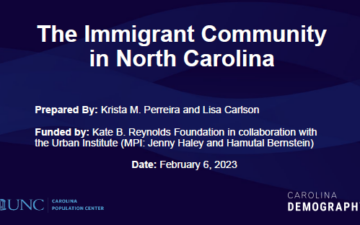In-migration plays large role in NC’s rising educational attainment

When we focus on educational attainment, we generally focus on prime working-age adults, defined here as adults between the ages of 25 and 64. There were 5.4 million prime working-age adults in North Carolina in 2017. Of these individuals, 2.3 million or 43.2% held a postsecondary degree:
Among the more than three million North Carolina prime working-age adults without a postsecondary degree, the largest number (1.3 million) had a high school diploma or GED, equivalent to 24% of NC adults aged 25-64. Another 1.2 million reported having some college, no degree, followed by 570,500 with less than a high school diploma, representing 22% and 11% of prime working-age adults, respectively.
How have these populations changed since 1990? The number of adults aged 25-64 living in North Carolina grew by 1.9 million between 1990 and 2017. Over this period, the number of adults without a high school diploma declined by 246,000. This decline reflects generational replacement as, over time, older, less educated workers are replaced by younger workers with higher levels of educational attainment.
At all other levels of attainment, the number of NC workers increased. Compared to 1990, in 2017 there were:
Apart from adults with a high school diploma or less than a high school diploma, all attainment groups grew faster than the overall population growth rate of 56%. The number of associate degree holders increased 98% and the number of postsecondary degree holders at all other levels more than doubled over this period. As a result, the share of North Carolina adults with a postsecondary degree increased 16 percentage points, rising from 27.2% in 1990 to 43.2% in 2017.
Much of the state’s growth between 1990 and 2017 was fueled by net in-migration, and this in-migration also fueled the steady increase in the number of NC adults with a postsecondary degree. Since 1990, the state population of prime working-age adults with a postsecondary degree increased by 1.4 million—974,600 or 70% of these new residents with a postsecondary degree were born outside of North Carolina. In 2017, 36% of NC-born adults aged 25-64 had an associate degree or higher compared to 50% of adults born outside of NC. (Note: sum of proportions in chart differs due to rounding).
North Carolina-born adults and adults born elsewhere were equally likely to report having less than a high school diploma. Compared to individuals born in another state or country, North Carolina-born adults aged 25-64 were more likely to have a high school diploma or equivalent; some college, no degree; or an associate degree. Individuals born in another state or country were more likely than their NC-born peers to hold bachelor’s, master’s, professional, or doctoral degrees.
Next up: an examination of trends in the type of postsecondary degree held from 2000-2017.
Subscribe to our mailing list to stay up-to-date with our NC education pipeline research.
Need help understanding population change and its impacts on your community or business? Carolina Demography offers demographic research tailored to your needs.
Contact us today for a free initial consultation.
Contact Us
The Center for Women’s Health Research (CWHR) at the University of North Carolina School of Medicine released the 12th edition of our North Carolina Women’s Health Report Card on May 9, 2022. This document is a progress report on the…

Dr. Krista Perreira is a health economist who studies disparities in health, education, and economic well-being. In collaboration with the Urban Institute, she recently co-led a study funded by the Kate B. Reynolds Foundation to study barriers to access to…

Our material helped the NC Local News Lab Fund better understand and then prioritize their funding to better serve existing and future grant recipients in North Carolina. The North Carolina Local News Lab Fund was established in 2017 to strengthen…
Your support is critical to our mission of measuring, understanding, and predicting population change and its impact. Donate to Carolina Demography today.